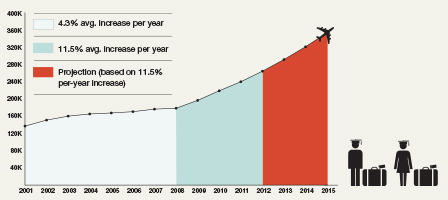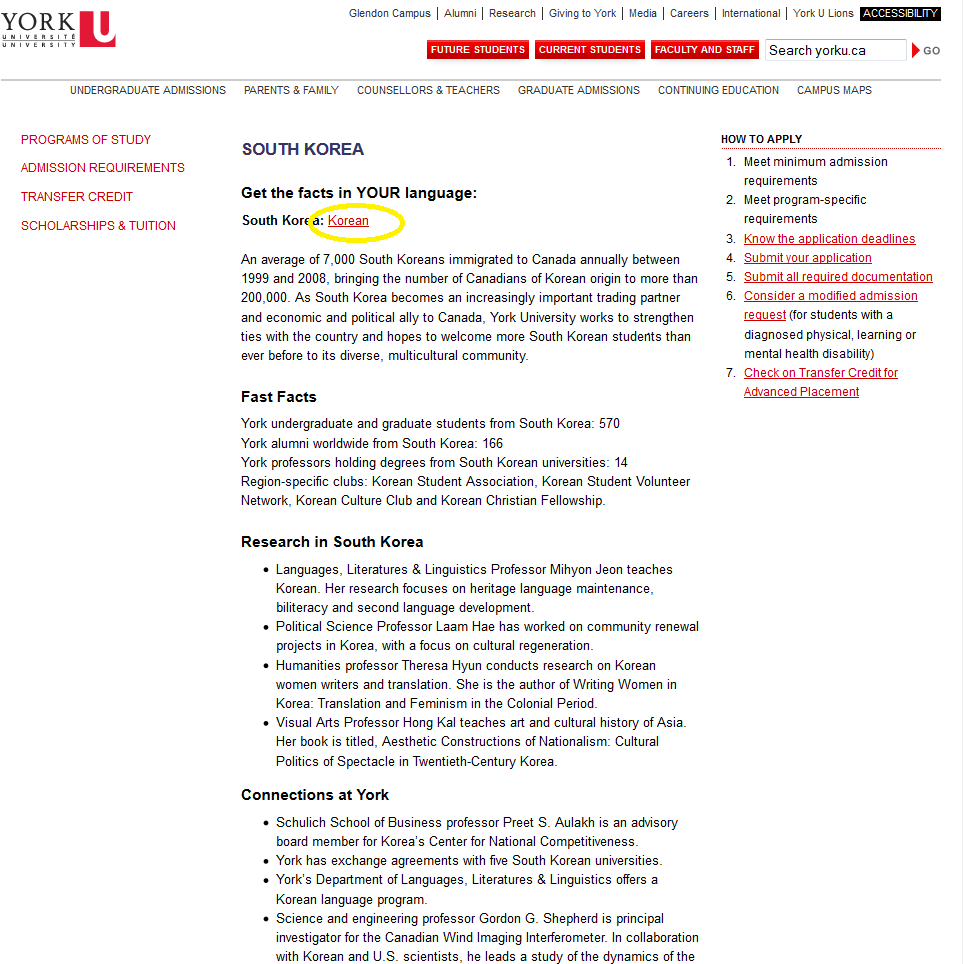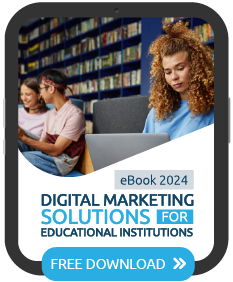Education is taken very seriously in South Korea – what other country would alter stock market and flight schedules just to minimize noise during school exam time? Based on factors including international test scores and graduation rates, South Korea has one of the best K-12 education systems in the world and the most higher education seekers per capita. It is estimated that the average Korean child spends 13 hours a day studying, including extensive time in the country’s private, after-school tutoring academies, known as hagwons.
English-fluency is a major competitive edge in the Korean job market and the free market has allowed at least one “rock star teacher” to earn $4 million annually, mostly from online video sales to high school students looking to improve scores on South Korea’s version of the SAT. Parents often send their children for study abroad for language acquisition and to spare them from the notoriously competitive and exam-focused Korean school system. This annual departure is also a result of only 10,000 of 550,000 high school graduates gaining entrance to one of the nation’s top three universities each year. For years, the country has been one of the world’s predominant sources of international students, surpassed only by China and India, but that may be changing.
Although it is too early to assess enrollment figures from this year, 2012 marked a 6% decline in Koreans pursuing degrees overseas and may represent the beginning of a mobility shift. A declining birth rate is expected to reduce the number of high school graduates from 670,000 in 2012 to 410,000 in 2024, and a shrinking middle class has made international schooling increasingly unaffordable. Governmental reforms making at-home education more affordable, a flourishing vocational sector, and a high unemployment rate for college grads are other factors affecting study abroad trends. Attending university at home offers students the opportunity to develop personal networks, deemed highly important for moving up in society. With a growing number of Asian universities becoming acknowledged as global leaders, more international students from this region are saving costs and keeping cultural ties by studying closer to home.
Understanding study abroad decisions
While these changes are a reminder for higher education institutions to diversify their international recruitment efforts – including future burgeoning markets such as Thailand, Vietnam and the Philippines – there certainly remains ample opportunity for student recruitment in South Korea. The booming private tutoring market suggests that families expect a very high level of engagement from educational services. Tutoring academies regularly send text messages to parents when their child has arrived to class and provide frequent progress reports. Messaging that focuses on the elite nature of an institute, especially in terms of successful Korean graduates, generally has a greater appeal for families. The greater proportion of tech-savvy undergraduate students indicates that social media can play an influential role in outreach efforts. Facebook and Twitter are hugely popular, the latter has twice the active user rate in South Korea as the world average.
Key factors influencing the South Asian study abroad decision include:
- Family & Peers: Parents are often the decision makers in sending their children abroad, influenced by extended family and the experiences of past students of a particular institution
- Brand Value: Stronger international reputations draw foreign students to top-ranked universities, creating diverse communities which attract others from those countries
- Interaction with Representative: Families understandably have many concerns and questions that agents abroad can clarify, increasingly through webinars and electronic messaging
- Employment: Business-related programs are the most popular field of study among international students and many seek study destinations providing work permits and with employment potential
- Visa/Residency: Recognizing foreign students are the ideal immigrants, Canada recently reduced working requirements and simplifying the process of becoming permanent residents to grads with Canadian work experience
- Existence of a Local Ethnic Community: Universities can promote factors that will make international students feel more at home, including Korean restaurants or student groups
Since international students tend to select, in order, a destination country, institution and program, colleges and universities benefit from embassy-sponsored student fairs in Seoul. The Canadian government has developed a strong national brand proposition and progressive policies that enable employment and potential citizenship are valuable for lead generation to all colleges and universities.
International students in Canada, Source: universityaffairs.ca
Developing partnerships are an effective strategy for building relationships in South Korea. Korea University is in talks with overseas colleges to co-produce lectures and already exchanges translation services with Japan’s Hokkaido University. Collaborative opportunities abound for institutions willing to make a long-term commitment in the region. Several branches of international schools have opened in recent years outside the major metropolitan areas, including plans to have 12 prestigious Western schools opening branches in the Jeju Global Education City by 2015, where everyone will speak only English.
Website recruitment strategies
Your website can be your most effective tool for recruitment in markets such as South Korea. Testimonials, including videos, from current Korean students provide important peer guidance regarding whether your institution is a good fit, content that can also be communicated via email and in your social media marketing efforts.
To overcome the language barrier, it may be cost effective to translate parts of your website:
- An institutional snapshot communicating the key features and benefits of your school in about one page, noting particular benefits to the target market
- Admissions information, considering visa and work permit applications and frequently asked questions to simplify the process, particularly for parents
Example: York University provides fast facts about South Koreans in Canada and their particular involvement with the school. A student profile with picture personalizes the process and there is a handy option to translate everything into Korean.
Understanding the significant cultural differences is the first step to creating a sustainable strategy for South Korean student recruitment. Developing student support resources to ease the transition will improve retention and the image of your school for further word-of-mouth referrals. International student mobility patterns will continuously evolve but creating a responsive strategy combining research, technology and partnerships with a long-term commitment can diversify your student body and increase enrollment.
Does your school have a recruitment strategy for South Korean students?








